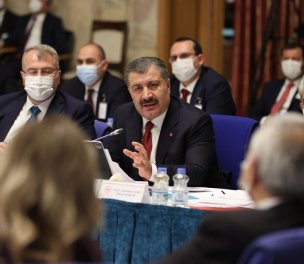* Image: Pixabay
Click to read the article in Turkish
Turkey has imposed a ban on travel from five African countries after the emergence of a new novel coronavirus (COVID-19) variant.
"Travel from Botswana, Republic of South Africa, Mozambique, Namibia, and Zimbabwe to our country through all our land, air, sea, and rail border crossings will not be allowed as of tonight," Health Minister Fahrettin Koca said on his Twitter account on Friday (November 26).
The World Health Organization (WHO) has declared the new coronavirus strain from southern Africa a "variant of concern," naming it Omicron.
The United Kingdom (UK) has also suspended flights from Botswana, Eswatini, Lesotho, Namibia, South Africa, and Zimbabwe, whereas the European Union (EU) member states have agreed to introduce rapid restrictions on all travel from these countries as well as Mozambique.
Travel bans, restrictions by several countries
As reported by the state-run Anadolu Agency (AA), Rwanda has become the latest country to suspend direct flights to southern Africa in a bid to prevent the entry of the new Omicron COVID-19 variant.
The Omicron variant, which was first reported by South Africa to the WHO on November 24, has been detected in at least a dozen countries.
"While the variant has not been detected in Rwanda, its effects are potentially dangerous, and therefore Rwandans and residents of Rwanda are required to exercise extra vigilance in the practice and enforcement of preventive measures," said a statement issued by the Rwandan Prime Minister's office following the Cabinet meeting yesterday (November 28).
Direct flights between Rwanda and southern Africa are temporarily suspended, it said. With the decision, Rwanda's flag carrier RwandAir has effectively suspended flights to and from Johannesburg and Cape Town in South Africa, Lusaka in Zambia and Harare in Zimbabwe. Several countries have tightened travel restrictions from southern Africa.
Statement by the WHO
The WHO, however, said in a statement yesterday that it is not yet clear whether Omicron could easily spread from person to person compared to other variants, even though the number of people testing positive has climbed in South Africa attributable to the variant.
"It is not yet clear whether Omicron is more transmissible (e.g., more easily spread from person to person) compared to other variants, including Delta," the organization said in a statement.
The WHO indicated that the increasing number of people testing positive and the rate of hospitalization in South Africa do not necessarily mean higher transmissibility or severity rates of the strain, noting that "this may be due to increasing overall numbers of people becoming infected rather than a result of specific infection with Omicron."
"There is currently no information to suggest that symptoms associated with Omicron are different from those from other variants," it added.
Based on limited information, the WHO also warned that people who have previously had COVID-19 could become re-infected more easily with Omicron as compared to other variants of concern, pointing out the need for more studies on the strain to better understand it.
While studies are underway to discover the effectiveness of COVID-19 vaccines and the current tests on the new variant, the medication used in the treatment of the coronavirus can still be effective in the treatment of Omicron, it added. (KÖ/SD)







